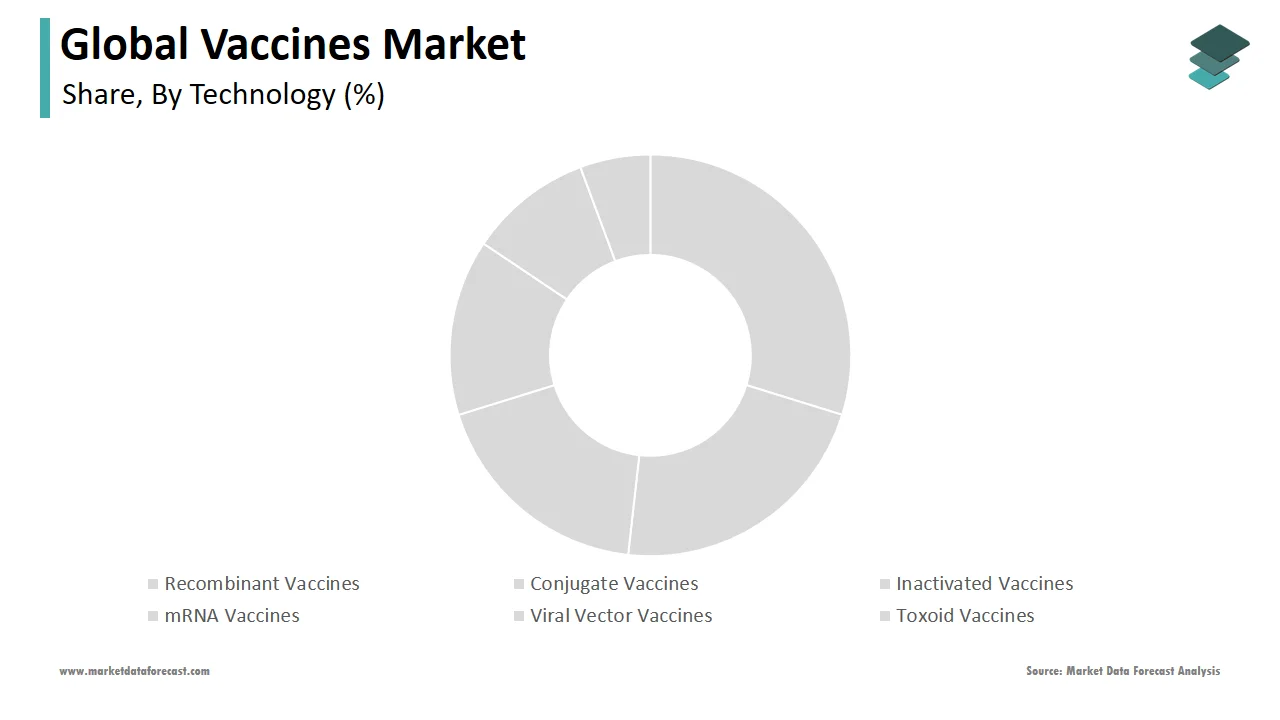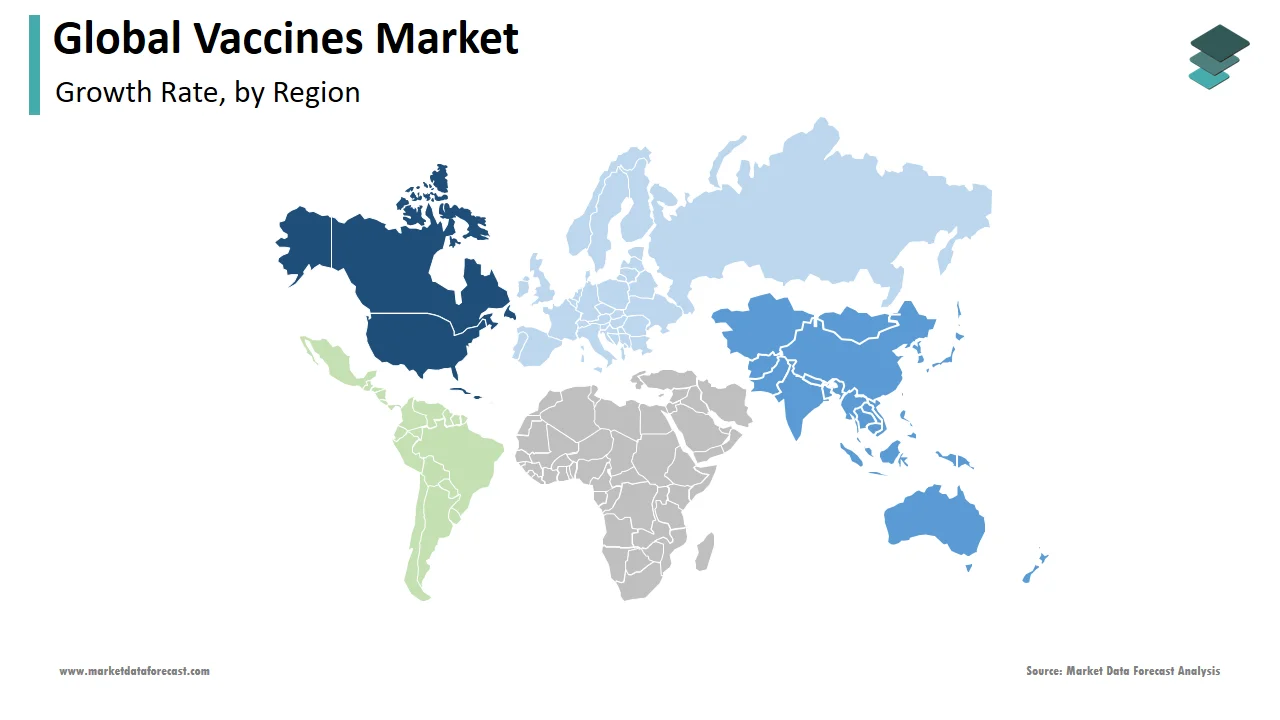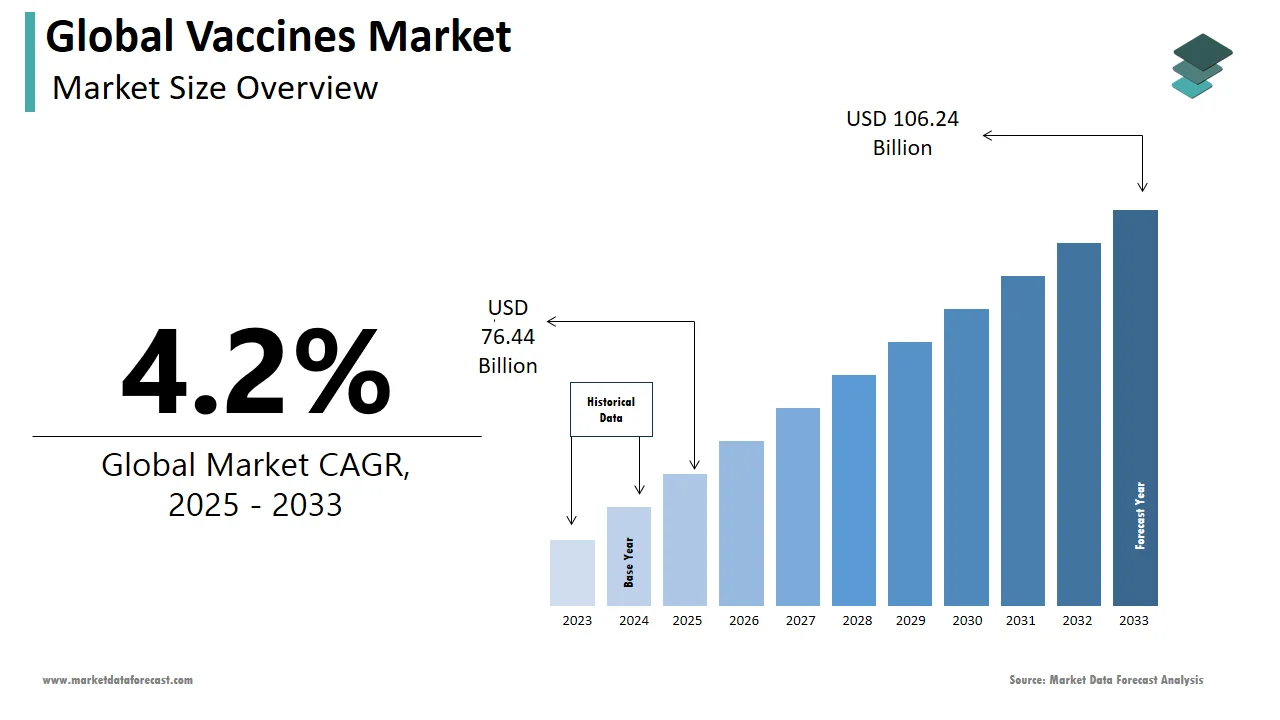Global Vaccines Market Size, Share, Trends & Growth Forecast Report By Technology, Administration, Age, Type, Indication and Region (North America, Europe, Asia-Pacific, Latin America, Middle East and Africa), Industry Analysis From 2025 To 2033.
Global Vaccines Market Size
The global vaccines market was worth US$ 73.36 billion in 2024 and is anticipated to reach a valuation of US$ 106.24 billion by 2033 from US$ 76.44 billion in 2025, and it is predicted to register a CAGR of 4.2% during the forecast period 2025-2033.
MARKET DRIVERS
Vaccines have been an integral part of the healthcare system for a long time now and the outbreak of COVID-19 once again highlighted their significance in the international market.
The deteriorating health conditions that are leading to several infectious diseases, epidemics, and pandemics are the primary factors driving the global vaccine market. In addition, the government campaigns emphasizing the role of vaccines coupled with supporting investments from both public and private sectors are also driving the demand in this business. Children and elderly people are more prone to infectious and seasonal diseases, becoming the largest contributors to the vaccines market. The increasing purchasing power along with the rising awareness about the benefits of vaccines in both rural and urban areas is also boosting the vaccine market. The recent advances in preventive medicine and vaccine methods like vector-based and mRNA further promote the adoptions in this business. Besides, the improving healthcare conditions in developing and under-developed nations and access to affordable treatments are further supporting the global vaccines market. With the increasing globalization, international travel, and access to world-class treatment have increased tremendously. In addition, with the increased travel options, new kinds of epidemics have surfaced lately that require vaccines to improve the immunity system. The people in Western countries face harsh cold conditions that can lead to influenza and pneumonia, which requires timely flu shots to prevent the spread and effects. Moreover, the continuous developments in medical technologies, such as synthetic vaccines and recombinant DNA techniques, expanding applications of vaccines in the treatment of HIV, Hepatitis, dengue, chickenpox, diphtheria, and others, and collaborations among service providers and research centers are further likely to create lucrative opportunities for the global vaccines market.
MARKET RESTRAINTS
The primary challenge to the vaccine market is the high expenses related to the research and development activities to produce new formulations.
Although the governments are supporting the development of new vaccines, the long approval process and safety complexities are acting as a challenge for the quick movement in this business. In addition, the lack of proper standardization and distribution channels like cold-chain logistics is limiting the sales in the vaccine market. Besides, the slow process involved in the development of new vaccines to handle rapidly spreading infectious diseases is a concerning aspect of the vaccine business. Also, the concerns among consumers about the side effects and long-term impact of the vaccines are a negative factor for the worldwide market. Moreover, the intense competition among market players that increases the end user pricing, changing mutations in viruses, slow-paced adoption of new vaccine technologies, and challenges with the large-scale production and distribution of vaccines further pose a serious threat to the global vaccine market.
Impact of COVID-19 on the Global Vaccines Market
The COVID-19 pandemic had a promising impact on the global vaccine market. The outbreak of this pandemic emphasized the need for powerful vaccines to combat new viruses and strengthen the immune system. All the pharmaceutical and biotechnology companies fastened the research and development activities to develop an effective vaccine to control the rapid spread of coronavirus and mortality in all parts of the world. In addition, governments across the globe shifted priorities towards control of the pandemic and supported the market players in this industry to continue their research towards advanced vaccines and mRNA technology. The international partnerships within medical facilities, research centers, and biotechnology firms promoted rapid developments in the vaccine business during COVID-19. The need for booster shots along with the required dosages further supported the sales of vaccines. On the flip side, the emphasis on the pandemic control temporarily halted the production and distribution of new vaccines for other infections. Also, the competition in the market led to increased prices of vaccination due to the immediate need to address the pandemic. On the whole, COVID-19 changed the perception among a large section of people about the use of vaccines, positively influencing the international marketplace.
REPORT COVERAGE
|
REPORT METRIC |
DETAILS |
|
Market Size Available |
2024 to 2033 |
|
Base Year |
2024 |
|
Forecast Period |
2025 to 2033 |
|
CAGR |
4.2% |
|
Segments Covered |
By Technology, Administration, Age, Type, Indication, and Region. |
|
Various Analyses Covered |
Global, Regional, and country-level analysis; Segment-Level Analysis, DROC; PESTLE Analysis; Porter’s Five Forces Analysis, Competitive Landscape; Analyst Overview of Investment Opportunities |
|
Regions Covered |
North America, Europe, APAC, Latin America, Middle East & Africa |
|
Market Leaders Profiled |
Johnson & Johnson, Pfizer Inc., GlaxoSmithKline plc., Merck & Co Inc., CSL, Sanofi, AstraZeneca, Bharat Biotech, Mitsubishi Tanabe Pharma Corp, Bio Farma, Inovio Pharmaceuticals, Daiichi Sankyo Company, Ltd., Sinovac, Valneva SE, Oxford Biomedica, Thermo Fisher Scientific, Fujifilm Corporation, Bavarian Nordic A/S, Emergent Biosolutions, Inc., Serum Institute of India Private Ltd, Moderna Inc., Sinovac, and Takeda Pharmaceutical Company Ltd., and Others. |
SEGMENTAL ANALYSIS
By Technology Insights

The recombinant and conjugate vaccines segment accounted for a significant portion of the vaccine market owing to supportive government regulations, investments in the pharmaceutical sector, and the rising incidence of chronic ailments. The surge in the cases of allergies, autoimmune diseases, cancers, and other diseases is also promoting the growth in this segment. The mRNA vaccines recorded a notable growth rate in the previous years due to the application of these vaccines in COVID-19 treatment. Also, the spike in the number of influenza patients is supporting the adoption of mRNA vaccines.
By Administration Insights
The intramuscular and subcutaneous segment accounted for the leading portion of the vaccine market due to the various advantages offered by this method such as easy absorption into the body, less risk of contamination, and less possibility of degradation. Besides, oral administration is touted to expand with a notable growth rate in the following years due to the increasing use of vaccines in pediatric treatment.
By Age Insights
Adults accounted for the lion’s share of the vaccine market because of the high volumes of vaccines administered during the COVID-19 pandemic. Besides, the booming number of influenza patients is further promoting sales in this segment. However, pediatric vaccines are predicted to register the highest growth due to the demand for oral dosages like polio and rotavirus in children.
By Type Insights
Multivalent vaccines, with their functionality to offer protection against multiple microorganisms and different diseases, are likely to witness the highest growth in this market in the future.
By Indication Insights
The viral disease vaccines accounted for the dominant portion of the global vaccines market and are likely to continue their dominion over the forecast period. The COVID-19 pandemic mainly fuelled the sales of the viral vaccines, followed by influenza, hepatitis, HIV, rotavirus, and so on. On the other hand, bacterial diseases are equally anticipated to grow considerably in the following years owing to the prevailing bacterial infections in work sites and industrial settings.
REGIONAL ANALYSIS

North America registered the highest share of the global vaccine market. The United States of America is the leading nation in the North American region. With the presence of some of the market giants, North America offers huge innovation opportunities for the growth of the vaccine market. The advanced healthcare infrastructure, awareness among people about the use of vaccines, and rising number of infectious disease cases are fuelling the business growth in this area. In addition, the spike in research and development activities in the medical sector and favorable government policies are supporting the market demand in this locale.
The Asia Pacific is predicted to grow at the highest rate over the forecast period due to the increasing population and need for preventive medicines. The continuous developments in the healthcare industry and investments in innovative technologies are supposed to fuel this local market. In addition, the rising awareness and modernization of the healthcare sector are encouraging more patients to prefer vaccines for treatment. China is the leading country in the APAC with advances in the pharmaceutical sector, awareness among the local population, and growth in the use of meningococcal vaccines in the area.
Europe is also a significant market for the vaccines market because of the availability of state-of-the-art medical facilities and specialized treatment options. The favorable insurance policies and more cases of influenza and pneumonia in countries like the United Kingdom, Germany, Norway, etc., are boosting business growth in this area.
Latin America has a relatively smaller presence in the global vaccine market compared to the above regions. However, the spike in demand for advanced treatments, established regulations, and growing investments in research activities are likely to create a huge opportunity for the Latin American market in the future.
The Middle East and Africa region has also been a smaller player in the vaccines market. The recent changes in countries like South Africa, Saudi Arabia, and the United Arab Emirates to improve the conventional healthcare infrastructure and easy availability of raw materials can act positively for the vaccine business in these nations.
KEY MARKET PLAYERS IN THE VACCINES
Companies playing a prominent role in the global vaccines market include Johnson & Johnson, Pfizer Inc., GlaxoSmithKline plc., Merck & Co Inc., CSL, Sanofi, AstraZeneca, Bharat Biotech, Mitsubishi Tanabe Pharma Corp, Bio Farma, Inovio Pharmaceuticals, Daiichi Sankyo Company, Ltd., Sinovac, Valneva SE, Oxford Biomedica, Thermo Fisher Scientific, Fujifilm Corporation, Bavarian Nordic A/S, Emergent Biosolutions, Inc., Serum Institute of India Private Ltd, Moderna Inc., Sinovac, and Takeda Pharmaceutical Company Ltd., and Others.
RECENT MARKET DEVELOPMENTS
- In May 2023, GlaxoSmithKline plc notified the approval of its adjuvanted respiratory syncytial virus vaccine named Arexvy to treat people aged 60 years and above with the condition of lower respiratory tract disease.
- In September 2023, Pfizer Inc. and BioNTech SE confirmed the approval of the supplemental Biologics License Application (COMIRNATY 2023-2025 Formulation) by the US’s Food Drug and Administration (FDA) to be used for individuals 12 years and older, as part of the COVID-19 vaccination.
- In October 2023, Novavax, Inc., a leading company in protein-based vaccines, proclaimed that its Adjuvanted (2023-2025 Formula) (NVX-CoV2601) COVID vaccine was approved by the FDA to support active immunization in people aged 12 years and above.
MARKET SEGMENTATION
This research report on the global vaccines market has been segmented and sub-segmented based on technology, administration, age, type, indication, and region.
By Technology
- Recombinant Vaccines
- Conjugate Vaccines
- Inactivated Vaccines
- mRNA Vaccines
- Viral Vector Vaccines
- Toxoid Vaccines
- Live Attenuated Vaccines
- Others
By Administration
- Oral
- Nasal
- Intramuscular & Subcutaneous
By Age
- Pediatric
- Adults
By Type
- Monovalent
- Multivalent
By Indication
- Bacterial Vaccines
- Viral Vaccines
- Allergy Vaccines
- Cancer Vaccines
By Region
- North America
- Europe
- Asia Pacific
- Latin America
- The Middle East and Africa.
Frequently Asked Questions
What role does innovation play in the vaccines market?
Innovation is critical in the vaccines market, leading to the development of safer, more effective, and easier-to-administer vaccines. Technologies such as mRNA platforms and advancements in adjuvants are transforming vaccine development and improving efficacy.
What challenges does the vaccines market face?
Challenges in the vaccines market include vaccine hesitancy, which affects vaccination rates, especially in some communities. Additionally, logistical hurdles in distribution, high research and development costs, and manufacturing complexities can pose challenges.
Are there specific regions dominating the vaccines market?
The vaccines market is globally distributed, but certain regions like North America, Europe, and Asia-Pacific are key contributors due to their advanced healthcare infrastructure, extensive research capabilities, and large population bases.
What factors influence the growth of the vaccines market?
Several factors impact the growth of the vaccines market, including technological advancements in vaccine development, increasing prevalence of infectious diseases, government initiatives promoting vaccination, rising awareness about preventive healthcare, and expanding research and development activities.
Related Reports
Access the study in MULTIPLE FORMATS
Purchase options starting from $ 2500
Didn’t find what you’re looking for?
TALK TO OUR ANALYST TEAM
Need something within your budget?
NO WORRIES! WE GOT YOU COVERED!
Call us on: +1 888 702 9696 (U.S Toll Free)
Write to us: [email protected]

